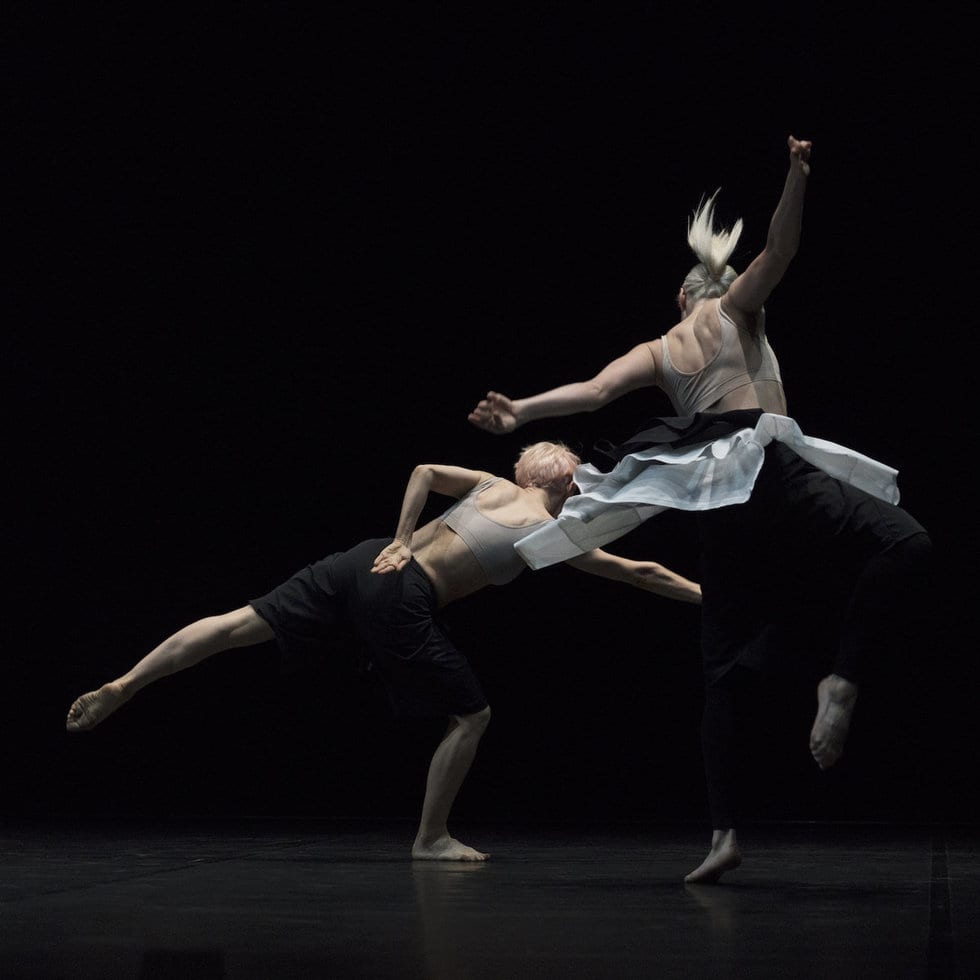
Jlin, born Jerrilynn Patton, has always had an affinity for the art of dance. However, while most listeners may associate her music with the footwork scene, “one of her lifelong dreams” has been to work with contemporary dance. Surely, her 2015 debut album Dark Energy and her highly acclaimed 2017 album Black Origami both use sporadic sampling techniques and frenetic kick patterns that allude to the improvised footraces of Chicago battlers. Though, these works also conceptually veer away from the underground dance scene into the interpretive movements of contemporary dancers, such as Avril Stormy Unger who has performed with Jlin at Boiler Room and Krakow’s Unsound Festival. Moreover, Jlin’s music videos have always focused on solo dance performances, asserting her experimental club music into the space of contemporary modern dance—”Carbon 7 (161)” follows the powerful, tautened contortions of Corey Scott-Gilbert, and “Unknown Tongues” moves with the bold, jagged twirls of Lilian Steiner.
Hence, Jlin’s intersection of club music and contemporary dance has organically led her to the soundtrack work for Wayne McGregor’s Autobiography. Linked together by Krakow’s Unsound for an ongoing effort to connect electronic musicians with choreographers, Jlin contorts her experimental club music to score McGregor’s choreographic memoir Autobiography, “a dance portrait illuminated by the sequencing of his own genome”. Although the soundtrack is not technically Jlin’s third album—her official third album is due in 2019 or 2020—it is an essential release of hers, as it continues her transgressive push of club music out of its ordinary spaces.
Jlin’s soundtrack spirals down the double helix, intertwining forward thrusting beats, carillon interludes, and ambient works. The tracklist is not necessarily collated, but this lack of structure is necessary for McGregor’s ever-evolving performance. For each showing of Autobiography, a computer algorithm based on McGregor’s genome selects a new order of the 23 dance sections, which alludes to the 23 pairs of chromosomes in humans. Hence, Jlin’s broad, malleable soundtrack is ready for the nightly variations of dance.
Nonetheless, the entire score is emblazoned with Jlin’s identity. She divulges, “Wayne told me so gently that he trusts me completely with my direction of creating the score”, giving her the creative freedom to insert her own DNA into the genome ofAutobiography. Accordingly, “The Abyss of Doubt” ruthlessly cuts with sharp, metallic synths, returning to a signature sound that remembers her prior job as a steel mill worker in Gary, Indiana. Moreover, “Unorthodox Elements” ricochets chopped speech into a stammering percussive effect, echoing the vocal experiments of her past works. And, “Kundalini” patters worldly drums over the twangs of sitars, resembling the global percussive assault that makes up Jlin’s distinct aesthetic.
However, most intriguingly, Jlin’s rigorous exploration of her genome—she recalls, “I would wake up at two in the morning and work until six in the evening until I completed all the pieces”—also discovers gentler productions for the score. While the majority of the 13 tracks are in line with Jlin’s familiar aesthetic of unrelenting, percussive beats, the soundtrack also presents five drumless compositions. “First Overture (Spiritual Atom)” and “First Interlude (Absence of Measure)” are abstract carillon pieces that patiently twirl chimes and bells over a gentle stream of aquatic samples. “Anamnesis (Part 1)” and “Anamnesis (Part 2)” are keyboard works that intrepidly lean into dizzying, dissonant progressions. And to close the soundtrack, “Second Interlude (The Choosing)” dauntingly strikes piano chords over a bed of droning strings and operatic vocals. Indeed, these drumless works prove that the percussive virtuoso can also compose tension through melody or ambiance.
Jlin’s soundtrack to Wayne McGregor’s Autobiography demonstrates the electronic producer’s rightful position in the contemporary dance space. Her experimental approach to club and ambient music complements the progressive choreographic mind of McGregor. The score’s staggered rhythms are easily tangled to abstract legs, and its disjointed melodies are naturally entwined to twisted arms, making Jlin’s soundtrack perfectly malleable for McGregor’s Autobiography.


![Call for Papers: All Things Reconsidered [MUSIC] May-August 2024](https://www.popmatters.com/wp-content/uploads/2024/04/all-things-reconsidered-call-music-may-2024-720x380.jpg)



